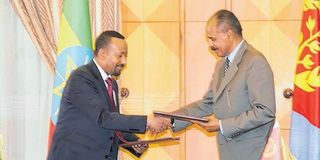Ethiopia, Eritrea stand to benefit in peace deal

Ethiopian Prime Minister Abiy Ahmed (Left) and Eritrean President Isaias Afwerki (Right).
PHOTO | FILE
Eritrea was once a province of Ethiopia that gained its independence in 1991 after 30 years of war. The two countries also battled a border war from 1998-2000, which led to the deaths of more than 100,000 people and left many families separated for the last 20 years. More than 70,000 Eritreans were deported from Ethiopia while Eritrea also expelled 45,000 Ethiopians in late 1990s.
Despite having a small population, Eritrea has regularly been generating the largest number of African refugees to Europe for years. After fighting its battle of liberation against the Derg regime for many years, Isaias Afwerki governed the newly independent Eritrea in the early 1990s and swiftly transformed it into a hermit state.
Since the 2000 Algiers agreement that led to ceasefirs, Eritrean President Isaias Afwerki has been using Ethiopia’s rejection of the border ruling to validate a host of repressive internal policies. These include imprisoning journalists and dissidents, refusing to implement the constitution and running an indefinite military conscription programme.
But Ethiopia’s new Prime Minister, Abiy Ahmed, paid a historic visit to Asmara on the 8th and 9th of July, 2018, whereby he and Eritrean President inked an agreement to end the war and resume diplomatic and trade ties.
Dr Abiy made the first move in June when he declared that Ethiopia would withdraw from the town of Badme and other disputed border zones, to abide by the UN 2002 decision from the UN-backed commission aimed at settling the Ethiopia and Eritrea border dispute.
Eritrea reacted positively by sending a peace delegation to Ethiopia and also withdrew its troops from the heavily militarised border with Ethiopia as a sign of reconciliation. It is believed that, the normalisation of diplomatic relations, trade, transport and communications ties would re-open the borders after years of bitter split-up, which could mean big benefits for both nations.
How would peace benefit Ethiopia?
Peace could help resolve Ethiopia’s difficulties at the sea: the country became landlocked after Eritrea, which contained Ethiopia’s entire coastline, split in 1993.
Economic unification
Also at the moment, Ethiopia seeks more economic unification with neighbours as far as the Horn of Africa is concerned. The outbreak of war for five years stopped the flow of Ethiopian merchandises through Eritrea’s Red Sea ports of Massawa, but trade and transport activities could resume.
Ethiopia has a very odd model for development, but an odd model that has created very high economic growth. Ethiopian was running out of foreign exchange to sustain that model. It’s a matter of how a country can get the cash as it has been borrowing from China.
Recent statements from the administration suggest that Ethiopia might begin to raise the money by selling stakes in their golden geese from major corporations like Ethiopia Telecom or Ethiopian Airlines. In this way, the country can get the dollars that they need to buy investment goods to drive growth.
On the digital economy, which factors into the country’s economic growth, there is an awful success of PR which makes Ethiopia to be some kind of the next China. I think this is a true comparison as long as you have the next China meaning with a 50-year lag, not a 10-20 year lag. Less than half of the adults in Ethiopia can read or write in any language.
That’s not needed to be a part of the digital economy. Someone at least can be able to read what is on his or her mobile phone.
Ethiopia’s manufacturing factor is around 4 per cent of GDP, despite the PR, there is only eight countries in the world with smaller manufacturing sectors than Ethiopia. The education numbers, the electricity numbers are just not there for either a digital economy or a big manufacturing sector.
It’s still a very rural, very poor agronomic economy. With the peace agreement with Eritrea, Ethiopia can reestablish ties with Eritrea, create a second export route and perhaps then get a better price when it comes to exporting their commodities through the port. So there is an advantage for longer-term trade.
Concerning on Ethiopia Airlines it is regarded that, Ethiopian Airlines is ready for business and will recommence multiple daily flights to Asmara, Eritrea following reconciliation between the two countries. This is one of the major developments and the resumption of air links will play a crucial role in boosting the overall political, economic, trade and people-to-people bonds between the two sisterly nations.
How would peace benefit Eritrea? In the similar vein, Eritrea also has an opportunity to recover its economy by reviving its links with Ethiopia. Eritrean industries could serve the growing markets of its much larger and more populous southern neighbour. Eritrea is going to gain a lot, because it will be able to follow Ethiopia’s economic momentum but settling the dispute with Ethiopia could also spur foreign investors to consider Eritrea free of the fear of incurring Addis Ababa’s wrath.
This is likely to improve relations between Ethiopia and Eritrea and will further harden the Eritrean state’s rehabilitation on the international scene. It should be noted that, under Abiy, Ethiopia appears to be boarding on a path of reform, but Eritrea has been branded as one of the most authoritarian and closed countries in Africa.
For much of the last 20 years, Eritrea has been concentrated on its war with Ethiopia, with substantial spending on its military force and indefinite mandatory military service that has caused hundreds of thousands of Eritreans to try to immigrate to Europe. The end of the conflict could open the way not only for the end of mandatory conscription in Eritrea but also a return to democratic provisions in the constitution that were suspended, including elections. The diplomatic relations with Ethiopia, re-established very recently, Isaias visited Ethiopia to re-open Eritrea’s embassy in Addis Ababa.
The author concludes that, the landmark agreement is the surest sign yet that a pivot away from security-centered statehood is possible. Following this historic incident, the similes of joyful Eritreans and Ethiopians receiving this news is a notice that, war occurs to people and to communities and the end of war causes celebration for everybody although it is too early to make definitive statements of what the future holds for these two states.
Mr Mansour is an assistant lecturer in the Department of Geography and Regional Economy, and a PhD candidate at Patrice Lumumba University in Moscow, Russia




